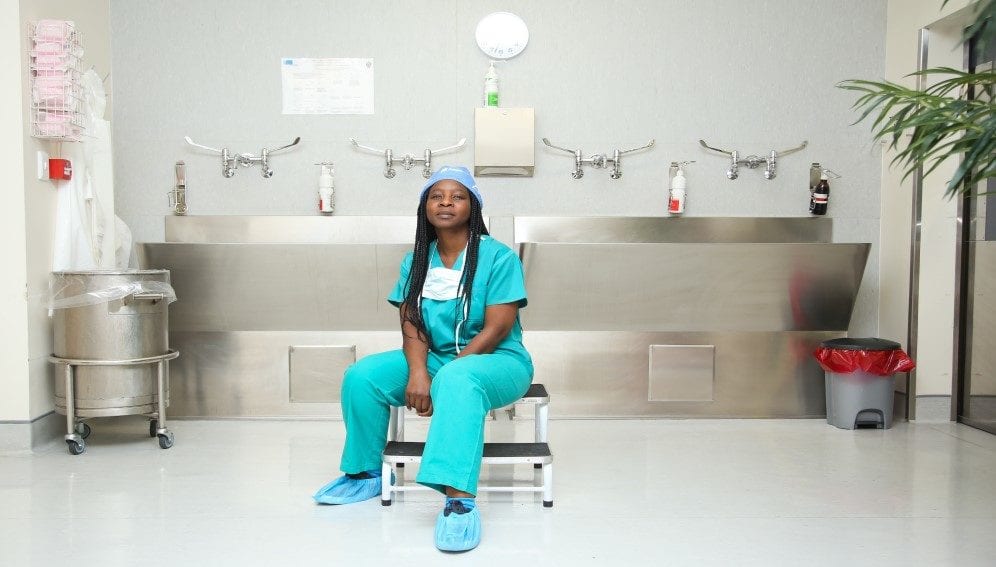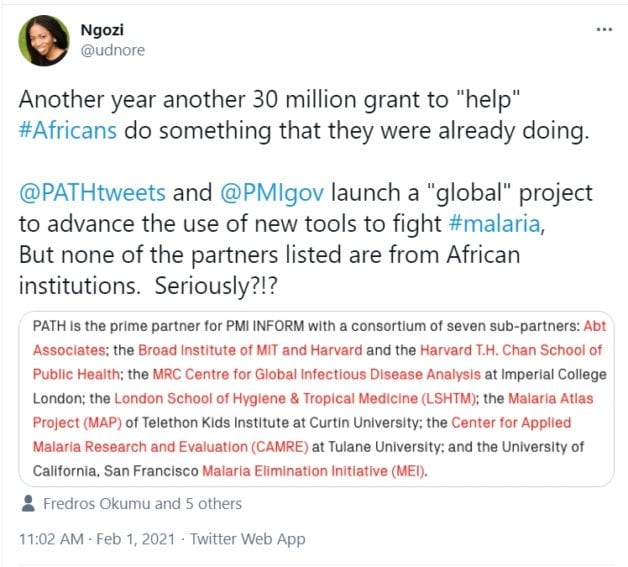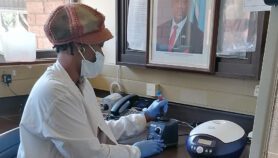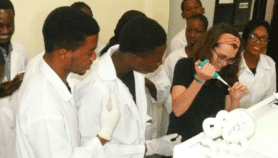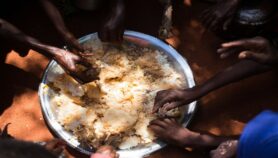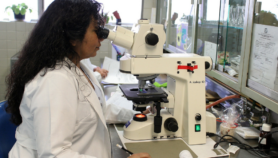By: Laura Owings
Send to a friend
The details you provide on this page will not be used to send unsolicited email, and will not be sold to a 3rd party. See privacy policy.
[CAPE TOWN] Tokenism, top-down management and inequality still plague African research collaborations with the developed world.
In spite of years of talk about collaborative partnerships, African researchers say that they are all too often consigned to the role of field worker or information gatherer despite being leaders in their science.
Inequality exists at many levels, with tensions typically similar to those embedded in donor-recipient relations in international development cooperation.
“I am not a field worker,” says Richard Mukabana, an entomologist at the University of Nairobi, who is known locally as ‘mosquito man’.
“I have a PhD and can be in any forum dealing with the science of malaria. That is my competitive advantage.”
He travels from Uganda to Kenya, meeting with laboratory technicians, speaking to community health workers and running samples to laboratories at the Uganda Virus Research Institute.
Some of his samples were collected from the swampy, stagnant water of the Lukaya rice fields on the shores of Lake Victoria, Uganda. The channels, just ten centimetre deep, are the ideal breeding ground for mosquitos. Using a makeshift ladle, fashioned on the end of a long wooden stick, he scoops up water hoping to capture the insects.
Yet he still has to collect data and give it someone in the global North to make sense out of it. That way you are just a porter carrying luggage, according to a documentary film, The Fever, which follows Mukabana in its story about malaria’s colonial legacy in Africa.
Global resources for malaria control and elimination totalled US$3 billion in 2019, according to the WHO. It specifically praises contributions to this work from the Global Fund to Fight AIDS, Tuberculosis and Malaria, and the US President’s Malaria Initiative.
“It’s a depressing state of affairs with seven US, UK and Australian partners receiving US$30 million to ‘help’ African national malaria control programmes.”
Bob Snow, senior scientific advisor for KEMRI-Wellcome’s INFORM project
Housed in the global North, among the world’s richest and most industrialised countries, these institutions provide significant funding toward the Sustainable Development Goals (SDGs) and the international development research agenda.
“I’m an African,” Mukabana tells SciDev.Net. “I live in Africa, I work in Africa, I know about the people in my household and myself becoming sick with malaria in Africa. But I also remember we have a lot of African problems to running the business of science.”
For instance, his university faces frequent amenities challenges such as lack of consistent running piped water and frequent power outages. “Even if we have the technology or the expertise, it’s difficult to be competitive with your partner,” he says.
One thing he knows the partner does not have, however, is a patient. “My collaboration partner doesn’t work with malaria patients, doesn’t know how the village person feels about a method or control, doesn’t have a mosquito breeding habitat,” he says.
Mukabana is just one researcher on a growing list of African scientists addressing the problem of malaria on the continent. A roll call of prestige, it includes scientists at the Kenya Medical Research Institute (KEMRI), who work on the KEMRI-Wellcome Trust Information for Malaria Project (INFORM).
Launched in 2013, KEMRI-Wellcome’s INFORM drives the use of epidemiological data to define malaria control and elimination in Africa with a visibly diverse African team.
Scientific colonialism
Shock, anger and calls of scientific colonialism flooded the KEMRI-Wellcome INFORM community in January 2021, when global non-profit PATH announced it was chosen to lead the US President’s Malaria Initiative (PMI) for a five-year US$30 million project.
Called the PMI Insights for Malaria (INFORM) project, its critics were quick to draw attention to the initiative’s similarities to KEMRI-Wellcome’s INFORM – not the least of which was its name.
According to the PATH announcement, PMI INFORM is expected to “generate evidence and data to inform national malaria programs and the global malaria community of best practices, while strengthening research capacity in PMI-supported countries.”
The prime partner for PMI INFORM, PATH also revealed its consortium of seven global North partners: Abt Associates; the Broad Institute of MIT and Harvard and the Harvard T.H. Chan School of Public Health; the MRC Centre for Global Infectious Disease Analysis at Imperial College London; the London School of Hygiene & Tropical Medicine the Malaria Atlas Project of Telethon Kids Institute at Curtin University; the Center for Applied Malaria Research and Evaluation at Tulane University; and the University of California, San Francisco Malaria Elimination Initiative.

“It’s a depressing state of affairs with seven US, UK and Australian partners receiving US$30 million to ‘help’ African national malaria control programmes,” says Bob Snow, senior scientific advisor for KEMRI-Wellcome’s INFORM project.
“Outrage needs to come from those who are most affected in the future by this behaviour of international donors.”
“My collaboration partner doesn’t work with malaria patients, doesn’t know how the village person feels about a method or control, doesn’t have a mosquito breeding habitat.”
Richard Mukabana, University of Nairobi
In a statement, PATH did not explain the coincidental project name, but said its PMI INFORM activities would complement KEMRI-Wellcome’s INFORM project. It also addressed the make-up of its consortium by saying it was designed to facilitate access to technical expertise and to supplement local capacity.
“Working with malaria programme leaders and researchers from malaria-endemic country institutions is core to the project’s planned approach for prioritising, designing, implementing, and disseminating malaria evaluation and operational research,” PATH told SciDev.Net.
Overlooked
While it’s shocking to see African institutions overlooked as partners by PATH, Ngozi Erondu, senior research fellow at the UK-based Chatham House Centre for Global Health Security, says it happens all the time.
“The bigger issue here is decolonising global health,” she says. Acknowledging the contributions global North institutions have made for the scientific knowledge base, she says it is not a question of all or nothing, but how to work together.
“Collaboration doesn’t mean you win all the money and employ the global South [partner]. That’s scientific colonialism,” she says.
Fredros Okumu, director of science at the Ifakara Health Institute in Tanzania tells SciDev.Net: “Researchers working in this space have good reason to be concerned about this trend.”
Okumu joined Erondu in taking criticism of PATH to Twitter, joining like-minded researchers and advocates. Hundreds of likes, retweets and comments followed with PATH accounts roped in.
The social media outcry does not just signal awareness of the broken state of international development research collaboration. It also shows that researchers are now able to stand up and say something.
“Ten years ago, this wouldn’t happen, we’d be worried about our careers,” Okumu says. “The world is willing to listen to these conversations now.”
Power dynamics
As a global South researcher, it is not unusual to get your start in a research collaboration with a cold call, says Salome Maswime, head of global surgery at the University of Cape Town(UCT), South Africa.
“I’ve been involved in a number of studies where I’m contacted by an international group and asked to be part of their study, usually as part of a grant needing a low- or middle-income country partner,” she says
“You go into the partnership without being clear about what you’re doing and you’re not really passionate about it. But you want to be associated with a good institution from a high-income country.”
When you are a young researcher, Maswime says, you go along with this because you want the publications, and you want funding. “The minute you get this email from a highly rated institution, a part of you feels good. Someone has hand-picked you and wants to work with you,” she says.
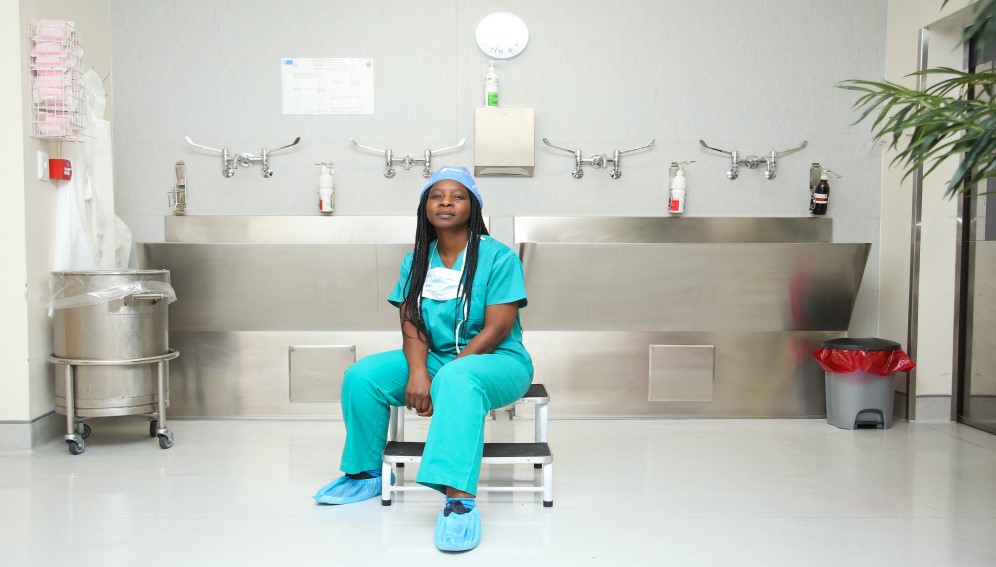


Salome Maswime, head of global surgery at the University of Cape Town, South Africa. Credit: Je’nine May
While not every collaboration goes this way, Maswime says that she has seen several young researchers trapped in the cycle. “I say this because I’m not at the beginning of my scientific career. I can look back and say there is a pattern here,” she says.
Tokenism is rife. It forms part of the unequal power dynamics of research collaborations funded by the global North, where the research agenda is driven by them rather than the communities doing the studies and being studied.
The problems with this top-down approach characterises these partnerships. A literature keyword search for “North-South collaboration” reveals a raft of challenges, experiences and proposed ways forward for more equitable partnerships in every area of development research.
Among them is the 1990 Commission on Health Research for Development that reveals a “gross mismatch” between priorities in North-South research that may make collaboration counter-productive.
Describing what is now known as the 10/90 gap, it revealed 90 per cent of the world’s investment in health research addresses only ten per cent of global health problems.
More recently, a 2020 paper on Namibian-German climate research projects pronounced an invisible “double role” for local researchers who managed field work, analytical tasks and acted as cultural facilitators.
“Global South researchers carry a hidden burden in international collaborations that has to be adequately acknowledged,” it concluded.
Other work details exploitive employment, where the short-term nature and tight budgets of research projects leaves local staff without benefits such as health insurance or long-term employment prospects. Some show the power struggles between North-South researchers when those who hold the purse strings are asked to play a supportive role to the host country.
“There are loads of publications on these partnerships, yet how far are we from achieving the SGDs?” asks Maswime. “People get Nobel prizes for work that’s done in Africa, but things haven’t changed.”
False universalism
Change isn’t going to come easy, says Mia Perry co-director of Sustainable Futures in Africa (SFA). A network launched in 2016 with the Global Challenges Research Fund, SFA is a UK-based network that works with hubs in Botswana, Malawi, Nigeria, Uganda and the United Kingdom to ethically re-design the research agenda.



“International development-related research is led by people and institutions that have and continue to benefit from the inequity,” she says. “To make real change in that system, people like me would have to put themselves in situations that may implicate us. That’s a difficult thing to do.”
Even harder, she argues, because most of the stakeholders involved believe they are making the world a better place. This South as in “deficit” and North as its “saviour” dynamic may be rooted in genuine goodwill, but it is built on a false sense of universalism.
For Perry, universalism is the idea that values, concepts or behaviours are shared across all people in all parts of the world. “Universalism is very convenient if you come from the universities or institutions of the global North. In the communities of our research partners in the South, their universal is nothing like mine.”
With SFA, Perry advocates for a move away from the geographic demarcations of North and South, to frame research as globally inter- and intra-connected.
Ditching traditional Northern-centric models of research is also necessary. Perry calls for a critique of the heritage of research and taking a participatory, culturally responsible and engaged approach.
“Any question we address should be considered from all perspectives along with scientists, community members and policymakers,” she says.
Notion of excellence
The truth about Africa, and other areas of the global South, is that science is not embedded in its culture. People do not look to science to answer questions in their daily lives in politics or in innovation.
“Africa isn’t the same as the North, where science is part of the fabric of their society,” says Judy Omumbo, senior programme manager at the Kenya-based African Academy of Sciences (AAS).
She too criticises the assumption that northern models for research and how it is managed will translate effectively in Africa. But she says it is difficult to challenge a system if it is coming from your funding partners.
“The question of equity is something we think about a lot. Because funding tends to come from the North, the priorities of the North are considered first,” she says.
Not the least of these priorities is accountability. Funders face scrutiny from their stakeholders to demonstrate outcomes and impact – as defined by the North’s perception of excellence.
“The notion of excellence is problematic in many, if not all, contexts,” say some experts. “It’s linked to highly subjective values of disciplines, methodologies, and is questionably linked to journal impact factors, H-index scores, sources of funding and university rankings.”
Global North researchers are also held to these standards, including the much debated ‘tyranny of the impact factor’. A career-defining magic number gained from publishing in high-impact journals, it is nearly impossible for African researchers to attain.
“African researchers face additional burdens that may be irrelevant or lesser in the global North,” say researchers from the AAS. Among these are prohibitive costs, predatory publishers and lack of familiarity with the peer-review process.
Systemic bias in the peer-review process is also a problem. “African researchers often come from institutions and laboratories unknown to their Western peers,” they say. This is compounded by a lack of African representation among peer reviewers, as well as language and style barriers that result in good research being delayed or going unpublished altogether.
“We need to define our impact based on what our researchers are doing,” says Omumbo. Do we want them to publish in top-notch journals? Or do we want them to make an impact and develop other local researchers?
“We should be able to make a decision on how we’ll measure excellence in our context, and funding should be given based on that.”
Knowledge-based economies
African researchers define research excellence as ‘creating awareness of societal issues’, ‘direct benefits to disadvantaged communities’ and ‘new technological developments’, according to a 2017 survey.
However, a third of those surveyed said insufficient funding and poor infrastructure were obstacles in achieving that excellence.
Despite African Union member countries committing to spend at least one per cent of their gross domestic product on research and development by 2010, none achieved the goal. In 2019, Africa accounted for just 0.9 per cent of global R&D spending, well behind North America at 27 per cent and Europe at 21 per cent.



Africa will then continue to rely on prosperous research partners from the global North. But Ombumbo says this support should take the form of long-term, strategic funding that enables Africans to conduct globally competitive research and builds knowledge-based economies on the continent.
“We need funding that goes toward improving the practice of science in the South,” says Ombumbo.
It is a paradigm shift in collaborations the AAS is pushing with its Future Leaders – African Independent Research (FLAIR) Fellowship, a partnership with the Royal Society, supported by the UK’s Global Challenges Research Fund (GCRF).
“FLAIR is unique in the sense that it’s a fellowship that’s lucrative enough for a fellow to carry out independent research while developing research capacity,” says Ombumbo.
FLAIR is open to African early career researchers addressing global challenges faced by developing countries. Its inaugural cohort was announced in 2019, with Sarah Fawcett, an oceanographer and climatologist at UCT among them.
Fawcett praises the fellowship for getting money into the hands of young African researchers “rather than to a northern partner with trickle-down into Africa”. But she suspects tension between the UK funders and Kenya-based AAS.
“The northern hand is still there,” she says. “But the funders are coming in with a big investment and are making an attempt towards empowerment. That’s how we start to change things.”
Globally competitive research
Fawcett is one of an elite group of researchers under the age of 40 that make up the 2020 World Economic Forum Young Scientists Programme, which also includes Maswime.
Honoured for her contributions to ocean chemistry and biology in climate change, her work is firmly footed in South Africa. It is an example of local-led development research that is globally competitive.
“The Southern Ocean is the biggest lever we have in terms of the ocean’s response to rising carbon dioxide emissions and we have unfettered access to it from South Africa,” Fawcett says.
Fawcett’s research will be conducted with support from the Biogeochemistry Research Infrastructure Platform (BIOGRIP). An initiative inspired by the South African Research Infrastructure Roadmap, in partnership with the European Union, it is a clear effort to provide long-term investment in the country’s research future.
For researchers such as Fawcett, BIOGRIP’s impact will be significant. “Not only can we collect our samples from an African research vessel in the middle of the Southern Ocean, but we can measure them in an African laboratory and publish an African-led study that has global implications,” she says.
The technical infrastructure expected from BIOGRIP will also make it possible for the global South to take the lead in international collaborations. But Fawcett says that power shift will only be possible through co-development.
“Framing objectives from the very beginning with all stakeholders at the table, and involving them in continual evaluation is the only way we’ll move closer to true collaboration,” she says.
Getting there together
South Africa is the third most biodiverse country in the world, and gives access to the Atlantic, Indian and Southern Oceans. It’s also the most economically prosperous country in Africa.
According to the 2019 South African Research Enterprise report, South Africa “punches above its weight” in research production, output and international research collaborations.
These advantages come with responsibility, says Salim Abdool Karim, director of the Centre for the AIDS Programme of Research in South Africa (CAPRISA).
“When you’re developing research collaborations, you have to take a long-term perspective. Your collaborators are going to compete against you, and your task is to make sure they compete against you well,” he says.
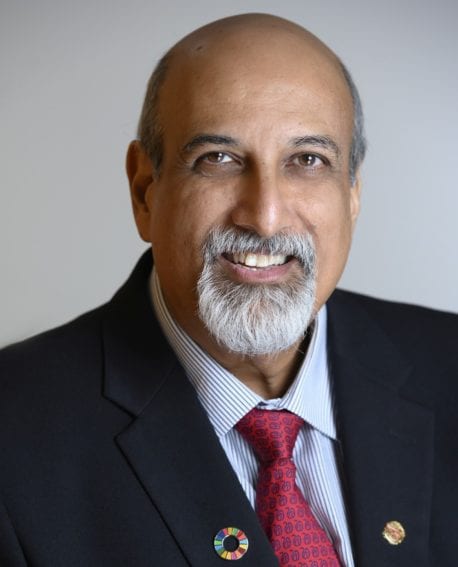


Salim Abdool Karim, director of the Centre for the AIDS Programme of Research in South Africa (CAPRISA) Credit: Abdool Karim
This is true for partnerships with the global North and on the continent. “We collaborate with [peers in] the United States and Europe and with our colleagues in Africa. We don’t want to have an unequal relationship with our colleagues in Africa just as we don’t want to be an unequal recipient of a collaboration in the United States,” Karim says.
Helping to ensure that is the Research Fairness Initiative (RFI). A self-reporting tool for institutions and funders, it helps them identify strengths and weaknesses in research collaboration policy and practice – and to develop them together.
“You should use every opportunity in a crisis to lay down good foundations for the future.”
Salim Abdool Karim, Centre for the AIDS Programme of Research in South Africa
With 36 indicators, it asks bodies to outline their approach to issues such as conflict management, contracts, financial management and intellectual property rights. The report that results can be used to develop and negotiate a strategy for fair partnerships. It’s a thorough and not uncomplicated process.
In fact, RFI has published only four reports since 2018, including one from the WHO’s Special Programme for Training and Research in Tropical Diseases and Senegal’s Université Alioune Diop. CAPRISA’s report has been put on hold as the centre deals with COVID-19.
“RFI needs early adopters who will pull in others. We don’t mind that its full of kinks. In fact, that’s part of how we work together to fix it and find better solutions,” he says. “What’s important is for all of us to work together in getting there, and RFI is helpful in that.”
Foundations for the future
Calling 2021 the Year of Equitable Research Partnerships, RFI is campaigning to recognise fairness in research collaborations and their potential for impact.
“The international research community moves from crisis to crisis,” says Carel IJsselmuiden, director of the Council on Health Research for Development, which set up the RFI. Whether it is malaria, climate change or COVID-19, he says, sustainable partnerships are never on the agenda.
“Let’s make developing partnerships an equal part of collaboration and develop agreements and benchmarks for the future,” he says.
Indeed, global collaboration and cooperation are in disarray, said the The Lancet ahead of the 75th session United Nations General Assembly held in September 2020.
“The need for global cooperation has never been more visible or more crucial,” it added. “But rather than expressing a shared vision for a common future, countries are now undermining global cooperation through rising nationalism, open hostility towards multilateral institutions, and a growing tendency to look after their own interests.”
They are issues that impact the global South the most, and to which those countries also contribute. But Karim, who is also co-chair of South Africa’s COVID-19 advisory committee, sees potential in this crisis.
“You should use every opportunity in a crisis to lay down good foundations for the future,” he says. “With COVID-19, I think things are changing for the better.”
This piece was produced by SciDev.Net’s Sub-Saharan Africa English desk.


